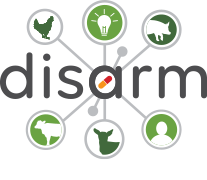Preventing and treating diarrhoea (caused by rotavirus/coronavirus/cryptosporidium) in pre-weaned calves
‘Prevention is better than cure’ for diarrhoea. This involves ensuring optimal hygiene at calving and in calf accommodation, regularly removing soiled bedding and steam cleaning, disinfecting and leaving calf pens empty, dry and in sunlight to rest between individuals/batches of calves. It is also important to clean feeding equipment with hot water and detergent between each feed. Depending on the bugs present on a farm, it is worth considering vaccination in adult cows to prevent the transmission of diseases like rotavirus to calves.
When calves have diarrhoea, it is crucial to keep them hydrated and fed, as demonstrated in this video Optimising calf health – Managing Cryptosporidosis
This farmer continues to feed milk as this provides the calf with energy, which supports their immune system in fighting disease. They also emphasize the importance of providing oral rehydration solutions to prevent dehydration, which can be purchased or a homemade solution can be used. This farmer combines glucose, salt, bicarbonate of soda, and a small amount of potassium chloride in a solution to provide calves with the necessary electrolytes when dehydrated. The imbalance in electrolytes caused by fluid loss from diarrhoea also causes acidosis, so the farmer provides a couple of tablespoons of bicarbonate of soda in the milk feeds to help combat this.
Use of Non-Steroidal Anti-Inflammatory Drugs (NSAID) helps to reduce fever and symptoms caused by inflammation so that calves feel better and continue to drink. Taking faecal samples to test for what is causing the diarrhoea so that the most effective treatment can be selected is key. These principles have led to this farmer reducing their calf mortality from 8% to zero and only using antimicrobials occasionally.
